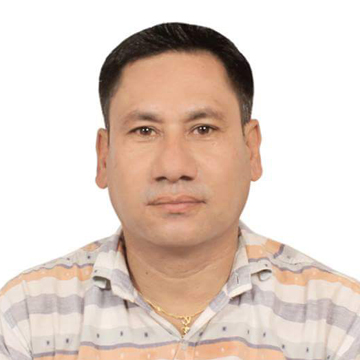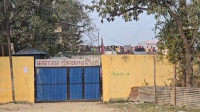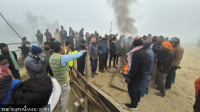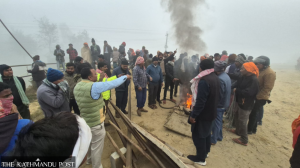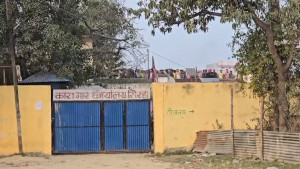Madhesh Province
Many local units in Madhesh are mired in disputes among elected officials
The discords have paralysed daily administrative work and development activities.
Shiva Puri & Ajit Tiwari
The growing hostility between Mahendra Mahato and Sunita Singh Budhathoki, mayor and deputy mayor of Mithila Municipality in Dhanusha, has affected important development projects and daily administrative works of the local unit.
Mahato, who was elected mayor on a Nepali Congress ticket, had postponed the municipal council meeting scheduled for June 25 after knowing that Deputy Mayor Budhathoki, who is from the UML, along with other local government officials elected from the party were planning to boycott the meeting.
No new date for the meeting has been announced. The council meeting was deferred last year as well due to similar differences between the two elected officials.
Sangita Kumari Ram, the deputy mayor of Rautahat’s Brindaban Municipality, boycotted the annual municipal council meeting accusing the mayor, Binod Patel, of attempting to convene the meeting without her consent. She accused the mayor of preparing the policy and programme as well as the budget unilaterally without consulting her and other elected representatives. Owing to the protest, Brindaban’s annual council was postponed soon after the inaugural function of the municipal council. Kumari Ram has the support of 28 people’s representatives including six ward chiefs.
The mayor and deputy mayor are currently not on speaking terms.
Ram Ekbal Yadav, a resident of Brindaban Municipality-7, says he is frustrated at the way things are unfolding in the municipality. “We elected the representatives to the posts with the belief that they would work for the welfare of the people,” said Yadav. “But the long-standing disputes between the mayor and deputy mayor show that our welfare is not their priority. Their disputes crippled development activities here and service seekers like me are also deprived of administrative services.”
Mayor Lalan Gupta and Deputy Mayor Muna Kumari Pokharel of Kanchanrup Municipality in Saptari district were both elected from the Congress. Expressing her dissatisfaction with the budget and the policy and programme, Pokharel proposed to postpone the ongoing municipal council on June 25. The deputy mayor has the support of the majority of members in the municipality.
According to the provisions of the Local Government Operation Act and Intergovernmental Fiscal Arrangement Act, all the local units in Nepal are required to present their annual budgets by June 25 every year.
Out of 136 local units in the Madhesh Province, 100 presented their budgets on time. However, as many as 36 local units failed to convene the annual council due to disputes among the people’s representatives. In most local units, there are long-running disputes between mayors and deputy mayors.
The annual council meetings for the upcoming fiscal year of two sub-metropolises, 18 municipalities and 16 rural municipalities were obstructed in the Madhesh Province this fiscal year. There are a total of one metropolitan city, three sub-metropolitan cities, 73 municipalities and 59 rural municipalities in the Madhesh province, which is the country’s smallest province in terms of area. Seven local units in Saptari, six each in Parsa and Rautahat, five in Bara, four each in Sarlahi and Dhanusha, two in Mahottari and one local unit in Siraha have yet to hold their annual council meetings.
Disputes among the people’s representatives have paralysed the local units in the province and affected daily administrative work and developmental activities.
In Kankalini Municipality of Saptari, Mayor Birendra Majhi and Deputy Mayor Sarita Sipaliya Yadav are in a long-running tussle, which has led to an indefinite postponement of the annual municipal council meeting. Majhi represents the Janamat Party while Sipaliya won the local election on a Rastriya Janata Party ticket.
Some of the issues that cause disputes among the mayors and deputy mayors include project selection, budget allocation, and use of office vehicles and other benefits. While the reason behind the disputes in most of the local units is that mayors and deputy mayors are from different parties, in some local units even those from the same political parties are also not on good terms.
Haripurwa Municipality in Sarlahi district has been the victim of two rival factions of the Nepali Congress. Mayor Binod Sah and Deputy Mayor Sumitra Devi Gwarin are from the same party, but they accuse each other of working unilaterally ignoring the genuine concerns of the other. Due to the dispute, the supporters of the deputy mayor padlocked the municipality’s office for about three months, which has hugely affected development activities. The lock was removed only two weeks ago.
“Of the total Rs340 million development budget, only around Rs15 million was spent in the current fiscal year. The budget of almost all development projects in Haripurwa has gone unspent due to the disputes,” said Nimesh Mishra, the chief administrative officer of the local unit.
The Local Election Act-2017 makes it mandatory for each political party contesting local elections to field a woman for either chief or deputy chief of local units. Most of the parties confine women to the deputy chief/chair position. The legal provision requiring one of the two candidates for the chief or deputy chief at the local level to be a woman is applicable only when a party fields candidates for both positions. But this requirement does not apply when parties contest elections by forming alliances resulting in women losing both the positions..
The Local Government Operation Act delegates various powers and authorities to the deputy mayor or vice-chair. The deputy mayor/vice-chair is the coordinator of the judicial committee, project monitoring committee, and the budget consultation committee, among others. But the deputy chiefs, mostly women, are denied the authority.
The female people’s representatives complained that women elected officials are not even given the roles guaranteed by prevailing laws. “The male representatives think that they are powerful. The deputy chief has the authority to monitor development projects and issue recommendations for payment. But the male local unit chiefs have been exercising that authority,” said Punam Chaudhary, the deputy mayor of Garuda Municipality in Rautahat district.
Chaudhary, six ward chiefs and 24 ward members staged a sit-in a few weeks ago stating that Mayor Kanthamani Jaisawal made decisions unilaterally by sidelining the deputy mayor and other people’s representatives. “We had to resort to protest as our powers and authorities were seized by the mayor,” said Chaudhary. Kanthamani, however, denied any wrongdoing. “We have not sidelined the deputy mayor in the decision-making process. We don’t know what her demands are,” he said.




 13.12°C Kathmandu
13.12°C Kathmandu